
OC240295
16 April 2024
Irene
[FYI request #26181 email]
Tēnā koe Irene,
I refer to your email dated 20 March 2024, requesting the following briefing papers under the
Of icial Information Act 1982 (the Act):
•
“OC230930 — Time of Use Charging and Tolling Design Choices
•
Auckland Airport Summer Peak Operational Performance
•
OC231147 — Meeting with Air New Zealand
•
OC231018 — Approval to Renew the New Zealand - Mexico Air Transport
Agreement
•
OC240064 — Airport Regulation
•
OC240032 — Ministry Work Programme Priorities: Further Information”.
I am withholding one briefing and releasing five briefings with some information withheld or
refused. The document schedule at Annex 1 details how the briefings have been treated.
The following sections of the Act have been used:
6(a)
as release would be likely to prejudice the security or defence of New
Zealand or the international relations of the New Zealand Government
9(2)(a)
to protect the privacy of natural persons
9(2)(b)(ii)
to protect information where the making available of the information
would be likely unreasonably to prejudice the commercial position of
the person who supplied or who is the subject of the information
9(2)(ba)(i)
to protect information which is subject to an obligation of confidence or
which any person has been or could be compelled to provide under
the authority of any enactment, where the making available of the
information would be likely to prejudice the supply of similar
information, or information from the same source, and it is in the public
interest that such information should continue to be supplied
9(2)(f)(iv)
to maintain the constitutional conventions for the time being which
protect the confidentiality of advice tendered by Ministers of the Crown
and officials
18(d)
the information requested is or wil soon be publicly available
transport.govt.nz | hei-arataki.nz
HEAD OFFICE: PO Box 3175, Wellington 6140, New Zealand. PH: +64 4 439 9000
AUCKLAND OFFICE: NZ Government Auckland Policy Office, PO Box 106483, Auckland 1143, New Zealand. PH: +64 4 439 9000

With regard to the information that has been withheld under section 9 of the Act, I am satisfied
that the reasons for withholding the information at this time are not outweighed by public
interest considerations that would make it desirable to make the information available.
You have the right to seek an investigation and review of this response by the Ombudsman,
in accordance with section 28(3) of the Act. The relevant details can be found on the
Ombudsman’s websit
e www.ombudsman.parliament.nz
The Ministry publishes our Of icial Information Act responses and the information contained
in our reply to you may be published on the Ministry website. Before publishing we wil
remove any personal or identifiable information.
Nāku noa, nā
Hilary Penman
Manager, Accountability & Correspondence
Annex 1 - Document Schedule
Doc# Reference
Document
Decision on release
1
OC230930
Time of Use Charging and Tolling Design
Withheld under Section 9(2)(f)(iv).
Choices
There is some related information already in
the public domain which can be found at
these links:
https://www.national.org.nz/national_act_and
_new_zealand_first_to_deliver_for_al _new_
zealanders
https://ourauckland.aucklandcouncil.govt.nz/
news/2023/11/auckland-council-endorses-
joint-team-to-explore-time-of-use-charging-
in-tamaki-makaurau/
https://www.legislation.govt.nz/act/public/200
3/0118/latest/DLM226230.html
https://www.legislation.govt.nz/act/public/197
4/0066/latest/DLM415532.html?src=qs
https://www.legislation.govt.nz/act/public/199
8/0110/latest/DLM433613.html?src=qs
https://www.nzta.govt.nz/assets/resources/an
nual-report-nzta/2022-23/waka-kotahi-
annual-report-2022-23.pdf (Page 136 refers)
2
n/a
Auckland Airport Summer Peak Operational
Released in full.
Performance
3
OC231147
Meeting with Air New Zealand
Released with some information withheld
under Sections 9(2)(a), 9(2)(b)(ii),9(2)(ba)(i)
and 9(2)(f)(iv).
4
OC231018
Approval to Renew the New Zealand –
Released with some information withheld
Mexico Air Transportation Agreement
under Sections 6(a) and 9(2)(a).
5
OC240064
Airport Regulation
Released with some information withheld
under Sections 9(2)(a) and 9(2)(f)(iv) and
one paragraph refused under Section 18(d).
6
OC240032
Ministry Work Programme Priorities: Further
Released with some information withheld
Information
under Sections 9(2)(a) and 9(2)(f)(iv).


Document 2
Te Tuhinga |
Memorandum
To
Hon Simeon Brown, Minister of Transport
From
Audrey Sonerson, Secretary of Transport
Date
19 January 2024
Auckland Airport summer peak operational performance
1982
On 19 December, border agencies, including the Ministry of Transport, met with Ministers
responsible for the Border to provide assurance on the summer peak. Auckland Airport and the
agencies have been working together since May 2023 on crowding and queueing problems.
Agencies also collate a specific, cross-agency, summer operational plan. A key goal of this work is
ACT
to improve passenger facilitation and ensure a positive passenger experience for travellers.
Auckland Airport has reached out to acknowledge the collaboration and effort that has been put in
by government agencies, alongside Auckland Airport, airlines and ground handlers, to prepare for
the summer season.
Auckland Airport have advised that so far across December and January to date, the system has
performed very well and significantly better than October and November. It has reduced the 95th
percentile, or the 5 percent of travellers who queue the longest, by around 20 percent for arrivals
and departures over the peak period. Attached for you interest is more detail contained within
Auckland Airports performance summary.
We will continue to work with Auckland Airport in 2024. Our focus for this year includes the
Regulatory Airport Spatial Undertakings (RASU) process. This process will be crucial to the future
passenger experience and queue times by ensuring agencies have the space they need to do their
INFORMATION
job efficiently and effectively.
RELEASED UNDER THE
OFFICIAL
Audrey Sonerson (she / her / Ms)
Hēkeretari o te Manatū Waka | Secretary for Transport
Te Manatū Waka | Ministry of Transport
transport.govt.nz | hei-arataki.nz
HEAD OFFICE: PO Box 3175, Wellington 6140, New Zealand. PH: +64 4 439 9000
AUCKLAND OFFICE: NZ Government Auckland Policy Office, PO Box 106483, Auckland 1143, New Zealand. PH: +64 4 439 9000
Page 1 of 1
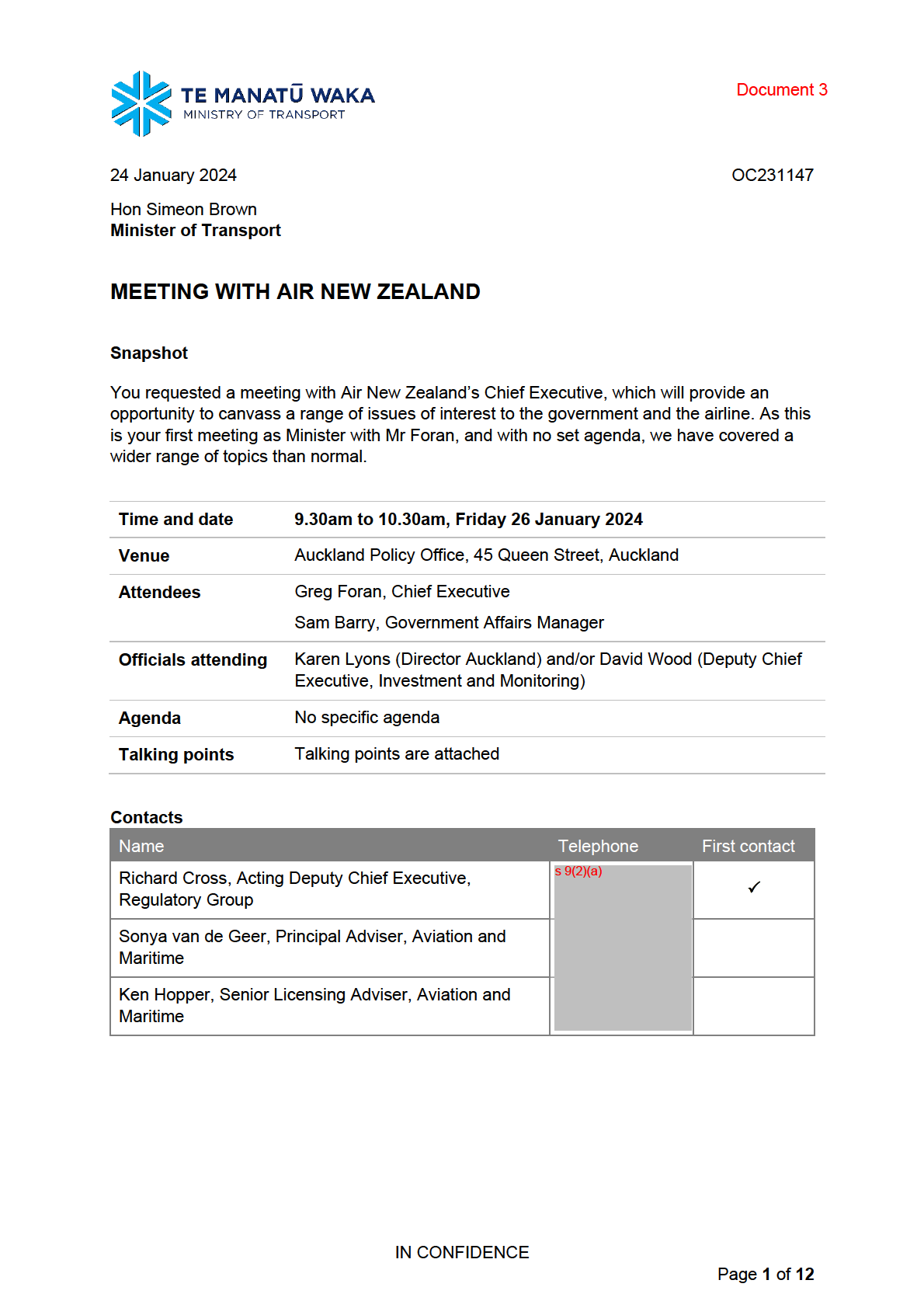
1982
THE
ACT
UNDER
INFORMATION
RELEASED
OFFICIAL
Meeting with Air New Zealand
Financial information
1
In August 2023, Air New Zealand announced its financial and performance results for
the 2023 financial year. Some highlights:
•
earnings before taxation of $574 mil ion (compared to a $810 mil ion loss in
the previous financial year)
•
operating revenue of $6.3 bil ion (compared to $2.7 bil ion in the previous
financial year)
•
domestic capacity at 94 percent of pre-Covid levels
1982
•
international capacity at 71 percent of pre-Covid levels
THE
•
more than $3.5 bil ion in aircraft investment through to 2028.
2
In 2023, Air New Zealand carried more than 10.6 mil ion passengers on domestic
ACT
flights (9.4 mil ion in 2022), and more than 5.3 mil ion passengers on its international
services (2.9 mil ion in 2022).
Airport investment and pricing
UNDER
3
Airport infrastructure investment, and the prices that follow, have been a long-
standing cause for dispute between airlines and airports.
Current regime
4
Since 2010, Auckland, Wellington and Christchurch airports have been subject to
information disclosure regulation under Part 4 of the Commerce Act 1986 (which
regulates markets where there is little or no competition).
INFORMATION
5
The Commerce Commission (the Commission) undertakes reporting and monitoring
RELEASED
under the Commerce Act, and the Minister of Commerce is the responsible Minister.
6
Information disclosure is the lightest form of regulation under Part 4. Airports must
disclose a range of information annually and at each five-yearly price-setting event.
The Commission reports on the disclosed information but it does not have the power
to compel airports to change their prices.
OFFICIAL
7
Following the first round of price setting under the new regime in 2012, the
Commission initially concluded that information disclosure was only effective for
Auckland International Airport. However, Wellington and Christchurch airports
subsequently made amendments meaning that all three largely met the Commission’s
expectations.
8
In 2019, Auckland Airport announced that it would reduce prices charged to airlines
for price setting event 3 (PSE3) by $33 mil ion, following the Commission’s initial
finding that it was targeting excessive prices.
IN CONFIDENCE
Page
2 of
12
9
Subsequent pricing changes, and thus the Commission’s reporting on them, have
been heavily impacted by the impacts of the COVID pandemic on the aviation
industry.
2017 review
10
The Ministry of Business, Innovation and Employment (MBIE) undertook a review of
the regime, which reported to Cabinet in 2017. The review concluded that the regime
was largely working as intended, but some changes were made to clarify the sort of
reporting that the Commission can undertake and to simplify the process for moving
to more heavy-handed regulation.
Civil Aviation Act changes
11
The Civil Aviation Act 1990 provides that, following consultation, airports may set
prices “as they see fit”. The new Civil Aviation Act 2023 retains the requirement to
1982
consult, and the statutory right to set prices, but removes the reference to “as they
see fit”.
THE
Auckland Airport development plans
ACT
12
In March 2023, Auckland Airport announced a $3.9 bil ion development plan. This
investment subsequently fed into announcements of price increases.
13
Airlines argued that the announcement ignored or cut off the consultation process,
and that lower cost and better phased development options for development are
UNDER
available. Airlines also argued that the proposals were excessive in order to increase
the Airport’s asset base and thus the return that it could make, particularly in a higher
interest rate environment.
14
The airport argued that the developments were essential to provide the level of
service passengers required both now and as passenger numbers grow. Airports also
argued that their charges make up a relatively small proportion of the fare a
passenger pays.
INFORMATION
Negotiate/Arbitrate regulation
RELEASED
15
Airlines have long argued for a move to negotiate/arbitrate regulation which is the
next step up the regulatory ladder in the Commerce Act. Airports would be required to
negotiate with airlines on prices and quality, and, if negotiation was unsuccessful, to
enter into binding arbitration.
16
Airlines argue that the current regime is not working to constrain prices, and with a
focus on whether the airports are making excessive profits, it does not adequately
OFFICIAL
address other outcomes sought under the Commerce Act relating to incentives to
invest and improving efficiency.
17
The Commerce Act regime applies to “aeronautical services”. Non-aeronautical
services such as car parks and retail facilities are not currently included. Airlines
argue that this should also change so that commercial returns are invested back into
aeronautical assets.
IN CONFIDENCE
Page
3 of
12
18
The process for changing the regulatory type is set out in some detail in the
Commerce Act. In short, the Commerce Commission undertakes an inquiry (either on
its own initiative or if required to do so by the Minister of Commerce) into how to
regulate airports and then makes a recommendation to the Minister. If the Minister of
Commerce decides to recommend further regulation an Order in Council may be
made.
19
As things currently stand, a move to negotiate/arbitrate would have to apply to all
three major airports (Auckland, Wellington and Christchurch). If issues were only
identified with one airport, this could mean that a move to negotiate/arbitrate might
not meet the statutory test that the benefits of regulation must materially exceed the
costs of regulation.
Environmental matters
1982
New Zealand’s Aviation Emissions
20
In 2019, domestic aviation was 5.2 percent of all transport emissions, and
THE
international aviation 19.9 percent of all transport emissions. Combined, aviation
emissions make up 5.9 percent of New Zealand’s total emissions.
ACT
21
Currently, New Zealand’s 2050 target includes emissions from domestic shipping and
domestic aviation (which are covered by the Paris Agreement). However, it currently
excludes emissions from international shipping and aviation.
UNDER
22
Under legislation, the Climate Commission is required to review whether the 2050
target should be amended to include emissions from international shipping and
aviation – and if so, how the target should be amended. The legislated deadline is
that this be provided to the Minister of Climate Change by 31 December 2024.
Sustainable Aviation Fuels (SAF) Feasibility Study
23
In June 2023, following a detailed evaluation process, Air New Zealand in partnership
with the New Zealand Government, announced it would proceed to the second phase
INFORMATION
of a detailed feasibility study considering the viability of domestically produced SAF.
RELEASED
24
The second phase of the study began late 2023. It is being carried out by LanzaJet
and Fulcrum BioEnergy. They are considering the viability of SAF production in
New Zealand using woody biomass and municipal solid waste as feedstocks
respectively.
25
Air New Zealand and MBIE have a Memorandum of Understanding regarding the
development of an industry for SAF. The airline wil commit research and
OFFICIAL
development funding in excess of $1.5 mil ion to the studies (with the funding being
provided in the 2024 financial year) and the MBIE tourism portfolio have committed to
co-funding $0.5 mil ion.
s 9(2)(b)(ii), s 9(2)(f)(iv)
IN CONFIDENCE
Page
4 of
12
s 9(2)(b)(ii), s 9(2)(f)(iv)
1982
THE
Sustainable Aviation Aotearoa (SAA)
ACT
31
SAA was established in 2022, as a public-private partnership (akin the to the UK’s Jet
Zero Council), to provide advice and coordination to accelerate the decarbonisation of
New Zealand’s aviation sector.
UNDER
32
Along with the Minister for Science, Research and Innovation, you are one of the
endorsing Ministers for SAA (as the Minister for Transport and Minister for Energy).
33
Air New Zealand sits on the SAA Leadership group, co-chairs the SAF Working
Group, and sits on the Strategy Working Group.
34
At the last SAA leadership group meeting, in July 2023, members agreed that
producing an updated State Action Plan for New Zealand, for the International Civil
Aviation Organisation (ICAO), to establish a long-term strategy on climate change for
INFORMATION
the international aviation sector, would be a key focus of SAA’s work in 2023.
RELEASED
35
MOT wil shortly be sending out invitations for the next SAA Leadership Group
meeting which wil take place late February or early March 2024. The next working
group meetings wil most likely take place in that same period.
Jet fuel resilience
OFFICIAL
36
Jet fuel supply has been raised both by airports, the Board of Airline Representatives
New Zealand (BARNZ) and Air New Zealand.
37
In September 2017, the pipeline that carries jet fuel from Marsden Point to Auckland
ruptured with no alternative route that could supply jet fuel quickly enough to meet
normal jet fuel demand. Airlines, including Air New Zealand, flying out of Auckland
Airport had to limit their use of jet fuel to 30 percent of their usual usage, which
caused significant flight disruptions.
IN CONFIDENCE
Page
5 of
12
38
There were further disruptions to jet fuel supply at Auckland Airport in December
2022 and Wellington Airport in April and December 2023. These were caused by jet
fuel imports that did not meet fuel quality standards when tested on arrival. A
significant number of flights were affected during the two Auckland Airport incidents,
while there were minimal disruptions to flight schedules during the Wellington Airport
incidents.
39
MBIE is the lead agency for the fuel sector. MBIE led the development of the Fuel
Industry (Improving Fuel Resilience) Amendment Act 2023 (the Act), which provides
for the minimum fuel stockholding obligation (MSO), and is consulting with the
aviation sector and fuel industry on the draft regulations on the information disclosure
requirements associated with the MSO this month.
40
From 1 January 2025, fuel importers wil be required to hold enough jet fuel in
New Zealand to provide 24 days of cover on average each month. For compliance
with this obligation, they can only count jet fuel stock in bulk storage tanks in 1982
New Zealand or on a vessel in New Zealand’s Exclusive Economic Zone scheduled
for delivery to New Zealand.
THE
41
The aviation sector supports the introduction of the MSO but generally would like to
have more stringent stockholding requirements. In their joint paper,
Six Actions to
ACT
Accelerate Aotearoa’s Aviation-enabled Future, the NZ Airports Association and
BARNZ suggested that the minimum stockholding requirement for jet fuel should be
32 days of cover.
42
The Act provides for a regulation-making power to introduce different
UNDER
stockholding levels for different engine fuels at different locations or for different
periods. Auckland Airport advocates for the Government to exercise this power to
require a minimum of 12 days of usable jet fuel to be stored nearby at Wiri.
43
s 9(2)(ba)(i)
INFORMATION
RELEASED
44
MBIE is currently leading the refresh of the National Fuel Plan, which provides
the framework for fuel emergency management and planning. The refresh wil ensure
the new Plan reflects the current liquid transport fuel resilience infrastructure
and response activities. In particular, the new Plan is expected to provide clearer
direction on the approach to managing aviation fuel supply disruptions.
OFFICIAL
Aviation security stewardship and AvSec queuing issues at Auckland Airport
45
Air New Zealand is a member of the Aviation Security Stewardship Group (SSG) –
led by the Civil Aviation Authority (CAA). The purpose of the SSG is to collaborate on
ways to improve the effectiveness and efficiency of the aviation security system. This
group has also been working on addressing the ‘unacceptable queues’ issue relating
to widely reported delays for aviation screening, particularly at Auckland Airport (MOT
is also engaged in this work).
IN CONFIDENCE
Page
6 of
12
46
The SSG also involves BARNZ, the Airports Association, Customs Brokers and
Freight Forwarders Federation, the CAA and MOT, and is expected to deliver benefits
to the system over time.
47
On 19 December, border agencies, including MOT, met with Ministers responsible for
the Border to provide assurance on the summer peak. Auckland Airport and the
agencies have been working together since May 2023 on crowding and queueing
problems.
48
Agencies also collate a specific, cross-agency, summer operational plan. A key goal
of this work is to improve passenger facilitation and ensure a positive passenger
experience for travellers. Auckland Airport has reached out to acknowledge the
collaboration and effort that has been put in by government agencies, alongside
Auckland Airport, airlines and ground handlers, to prepare for the summer season.
49
Auckland Airport have advised that so far across December and January to date, the
1982
system has performed very well and significantly better than in October and
November. It has reduced the 95th percentile, or the 5 percent of travellers who queue
THE
the longest, by around 20 percent for arrivals and departures over the peak period.
ACT
Civil Aviation Act 2023
50
The Civil Aviation Act 2023 received Royal assent on 5 April 2023, and wil come into
force on 5 April 2025.
UNDER
51
For operators in the system, nothing changes until April 2025. They wil continue to
operate as they currently do, under the Civil Aviation Act 1990 and Airport Authorities
Act 1966, while the implementation work is underway.
52
MOT and the CAA are working closely together to implement the Act and we wil
continue to engage with Air New Zealand as this progresses.
53
Implementing the new Act requires remaking the current Civil Aviation Rules to align
with the 2023 Act. This is a significant job for MOT and the CAA, but for operators,
INFORMATION
the remade rules wil generally remain the same in intent and impact.
RELEASED
54
Officials wil be engaging with Air New Zealand on several new systems brought in by
the new Act, including:
•
independent reviews of the Director of Civil Aviation’s decisions;
•
delivering our international commitments under the ICAO Carbon Offsetting
and Reduction Scheme for International Aviation (CORSIA); and
OFFICIAL
•
updated processes for airline alliance agreements and international airline
licensing.
55
We wil also liaise with you to progress work on rules to support the new Act’s drug
and alcohol management requirements. We anticipate these new rules wil undergo
public consultation, led by the CAA, in the first half of this year.
IN CONFIDENCE
Page
7 of
12

1982
THE
ACT
UNDER
INFORMATION
RELEASED
OFFICIAL
chose not to exercise. Air New Zealand has code-shared, for a number of years, to
six other destinations in India on services operated by Singapore Airlines.
63
Air New Zealand makes use of the international air rights for which the Ministry has
the lead responsibility in negotiating. Which routes to operate, and with how much
capacity, are commercial decisions for the airline. As an important element in
New Zealand’s international connectivity, Air New Zealand’s plans are of wide
interest.
64
For example, whether it is contemplating additional services to China, where it
currently operates a daily service to Shanghai. (New Zealand airlines have the right to
operate 70 passenger services per week to China, and Chinese airlines have the right
to operate 70 passenger services per week to New Zealand.) Also, whether it might
restart the services to Buenos Aires it ended with the onset of the pandemic.
Currently, there is a lack of competition in this market with Chile’s LATAM providing
the only direct air service between New Zealand and South America.
1982
Commonwealth Heads of Government Meeting (CHOGM) THE
65
Samoa is hosting CHOGM in October 2024. This wil likely see an unprecedented
ACT
number of flights to/from Samoa at that time, which may temporarily impact Air
New Zealand’s operations there.
66
The Ministry of Foreign Affairs and Trade is leading New Zealand’s collaborative
approach with Samoa in the lead-up to CHOGM in consultation with a number of New
UNDER
Zealand agencies, including MOT. Air New Zealand is also included and is keen to
have early indications of any adjustments it may have to make to its Auckland – Apia
services.
Airline alliances
Air New Zealand and Singapore Airlines alliance
INFORMATION
67
Air New Zealand and Singapore Airlines have applied for reauthorisation of their
airline alliance, which was first authorised in 2014 and re-authorised in 2018. The
RELEASED
current authorisation expires on 28 March 2024. The airlines have asked for a
decision well in advance of this date, as the decision influences business planning.
68
We provided you with initial advice in December 2023. We are finalising our analysis
and wil be ready to provide the Associate Minister of Transport with final
recommendations by 9 February 2024.
OFFICIAL
Air New Zealand and Virgin Australia code-sharing agreement
69
Air New Zealand and Virgin Australia have applied for authorisation to give effect to a
new code-share agreement. We have invited submissions from interested parties due
by 1 February 2024. We have begun our analysis and expect to provide
recommendations by early May 2024.
70
An application has also been made to the Australian Competition & Consumer
Commission (ACCC). Australia is operating to an April 2024 timetable and, unlike
IN CONFIDENCE
Page
9 of
12
New Zealand, can issue an interim authorisation pending a final determination. We
wil closely monitor any progress or determination by the ACCC.
Air New Zealand and Cathay Pacific alliance
71
Air New Zealand’s alliance authorisation with Cathay Pacific expires on 31 October
2024. We encourage early engagement with officials by the airlines ahead of applying
for reauthorisation.
1982
THE
ACT
UNDER
INFORMATION
RELEASED
OFFICIAL
IN CONFIDENCE
Page
10 of
12
 Biographies
Greg Foran, Chief Executive Officer
Biographies
Greg Foran, Chief Executive Officer
Greg started as CEO of Air New Zealand in February
2020. He is a member of the China Business Council.
He joined the airline from Walmart U.S where he was
CEO from 2014 to 2019. He was responsible for the
strategic direction and performance of the company's
4,600 stores and more than 1 mil ion staff.
He joined Walmart International in 2011 and served in
several capacities, including President and CEO of
Walmart China. Prior to joining Walmart International he
1982
held several senior positions with Woolworths.
THE
He has attended Advanced Management Programs at
Harvard University and the University of Virginia. He also
ACT
holds a Diploma in Management from the New Zealand
Institute of Management.
Sam Barry, Government Affairs Manager
UNDER
Sam has held his current role since July 2023. He has
previously worked at the Ministry of Foreign Affairs and
Trade, with postings in Brasilia and Seoul.
INFORMATION
RELEASED
OFFICIAL
IN CONFIDENCE
Page
11 of
12
ANNEX 1: TALKING POINTS – MEETING WITH AIR NEW ZEALAND
Airport Investment and Charging
• What do you think Auckland Airport’s future investment programme should look like?
• Why do you think the benefits of moving to a negotiate/arbitrate regime for airports would
exceed the costs of regulation?
Airports
• How is Air New Zealand’s relationship generally with the various New Zealand airports at
which you operate?
Sustainable aviation fuels
1982
• I am interested in hearing your views on means of promoting the development of
sustainable aviation fuels.
THE
Jet fuel resilience
ACT
• Do you have any views on possible measures to increase local jet fuel resilience?
Civil Aviation Act 2023
• I am grateful for your support for the Civil Aviation Act 2023, including Air New Zealand’s
UNDER
submission to the Transport and Infrastructure Committee.
• My officials have begun engaging with your organisation and others in the aviation sector
to ensure that we transition to the new regime effectively and efficiently. I expect officials
to continue to engage with you this year as implementation of the 2023 Act progresses.
• While some new systems and rules wil need to be introduced to reflect the new Act,
officials wil remain focused on keeping the fundamentals of the system in place to
INFORMATION
ensure safety and business continuity in the sector.
RELEASED
International operations
• Is Air New Zealand intending to increase its frequency of services to China?
• Is Air New Zealand considering resuming services to Buenos Aires, or starting services to
another point in South America?
Airline alliances
OFFICIAL
• I have delegated responsibility for airline alliances and air services agreements to the
Associate Minister of Transport.
• (
If asked about reauthorisation of the Singapore Airlines strategic alliance agreement …)
Officials are expected to submit final recommendations in early February 2024.
• (
If asked about authorisation of the Virgin Australia code sharing agreement…) Officials
are working toward providing recommendations in late April or early May 2024.
IN CONFIDENCE
Page
12 of
12

Document 4
1982
THE
ACT
UNDER
INFORMATION
RELEASED
OFFICIAL
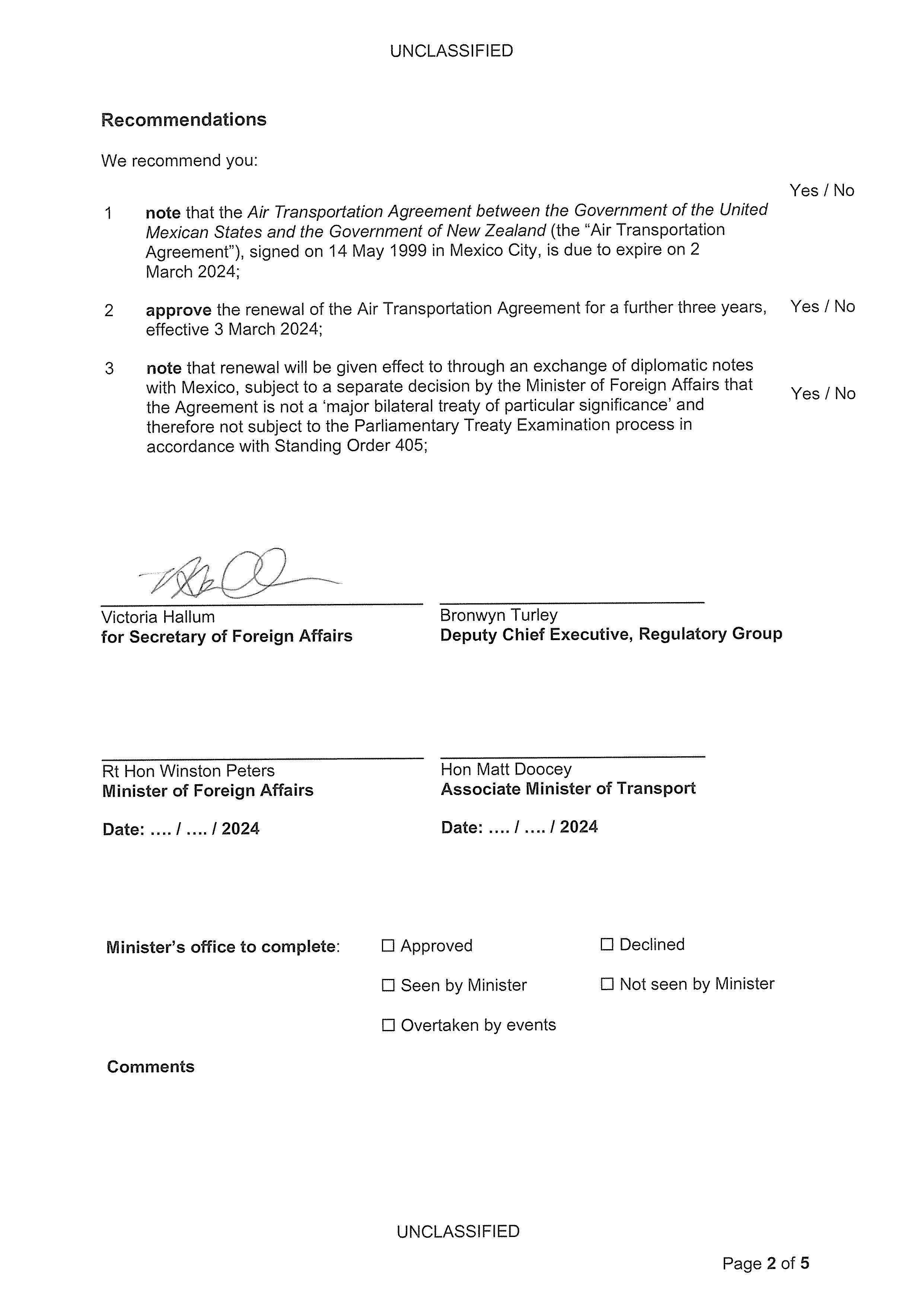
1982
THE
ACT
UNDER
INFORMATION
RELEASED
OFFICIAL

1982
THE
ACT
UNDER
INFORMATION
RELEASED
OFFICIAL
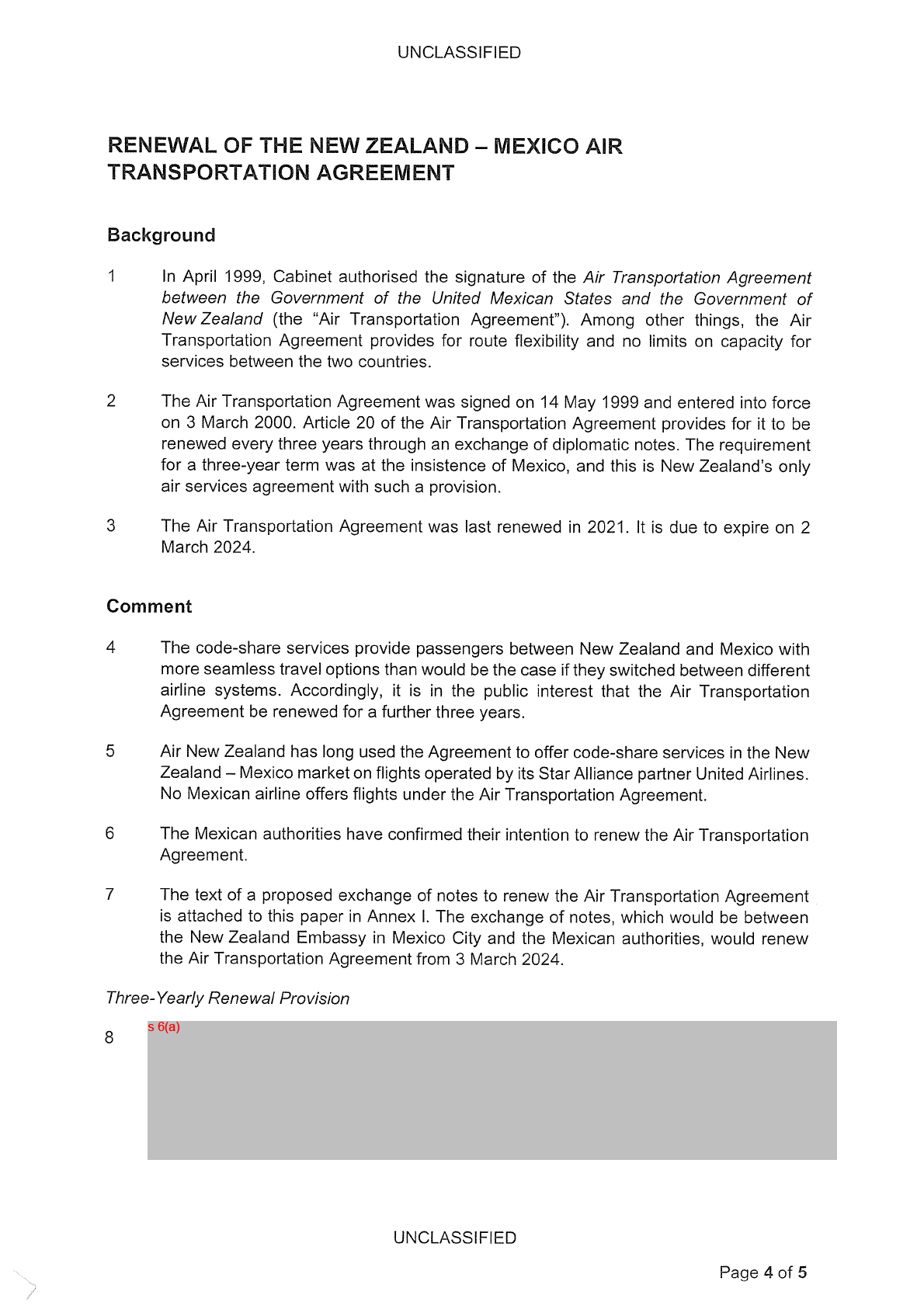
1982
THE
ACT
UNDER
INFORMATION
RELEASED
OFFICIAL
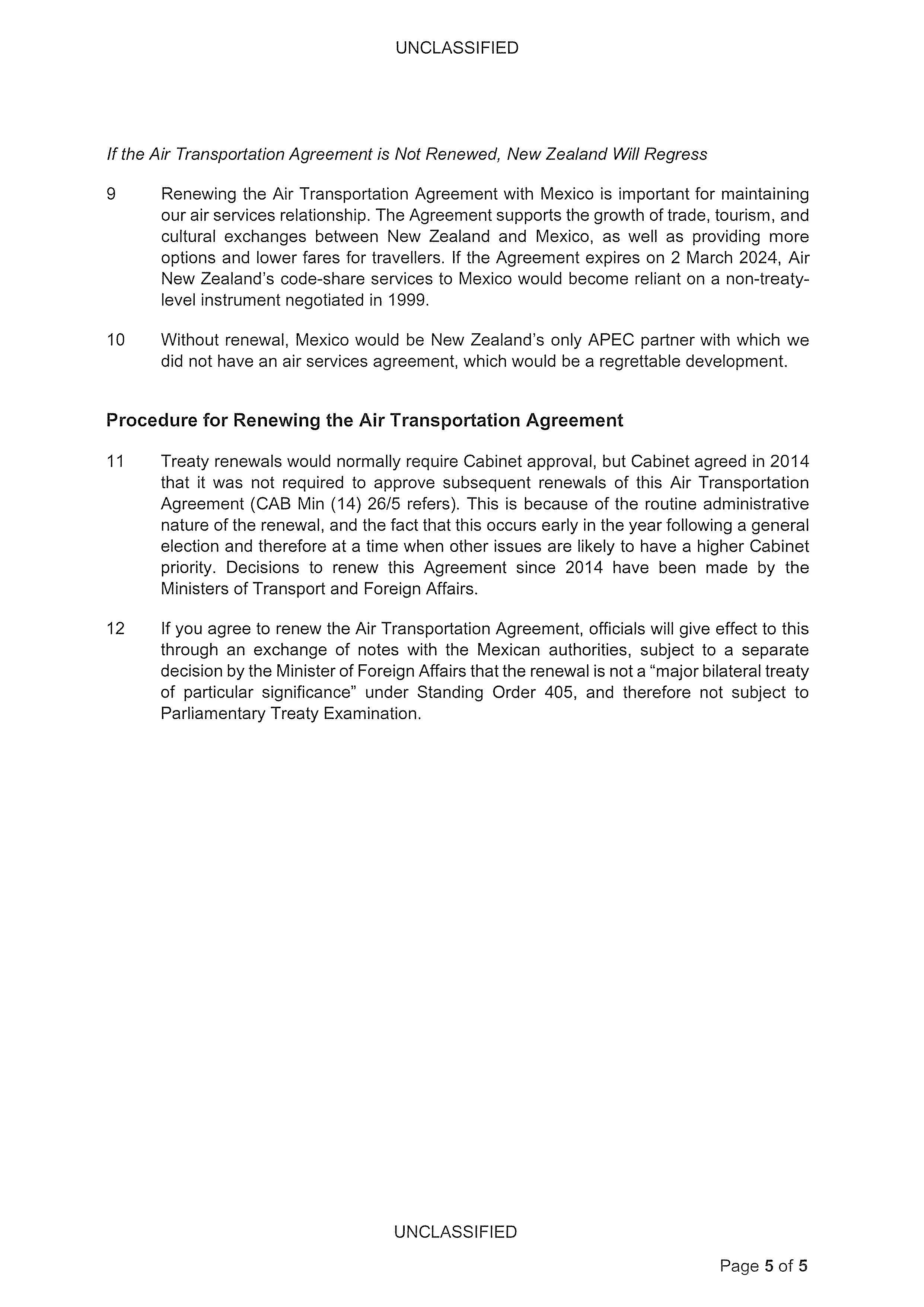
1982
THE
ACT
UNDER
INFORMATION
RELEASED
OFFICIAL

1982
THE
ACT
UNDER
INFORMATION
RELEASED
OFFICIAL

1982
THE
ACT
UNDER
INFORMATION
RELEASED
OFFICIAL

IN CONFIDENCE
Document 5
31 January 2024
OC240064
Hon Simeon Brown
Action required by:
Minister of Transport
Wednesday, 7 February 2024
AIRPORT REGULATION
Purpose
1982
To respond to your request for additional information about the pros and cons of a
THE
negotiate/arbitrate regime for airports or a Commerce Commission market study.
ACT
Key points
• Economic regulation of Auckland, Wellington and Christchurch airports is undertaken by
the Commerce Commission (the Commission) pursuant to the Commerce Act 1986
(Commerce Act). The Minister of Commerce, Hon Andrew Bayley, is the responsible
UNDER
Minister.
• The Commission considers that to date the regulated airports have been responsive to
the Commission’s review conclusions.
• However, airlines consider that Auckland International Airport is overinvesting in
infrastructure and that the regulatory regime is not adequately addressing this.
•
INFORMATION
The Commerce Act sets out a process for moving up the regulatory ladder to a
negotiate/arbitrate regime following an inquiry initiated by the Minister of Commerce or
RELEASED
the Commission on its own initiative.
• Any investigation of the impacts of negotiate/arbitrate would need to look at a number of
impacts, including whether or not it would:
o
lead to the sort of commercial negotiation behaviour that would be seen in a
competitive market;
OFFICIAL
o
produce cost savings that would be passed on to consumers;
o
be cost effective.
IN CONFIDENCE
Page
1 of
7

1982
THE
ACT
UNDER
INFORMATION
RELEASED
OFFICIAL
IN CONFIDENCE
AIRPORT REGULATION
Airlines consider that Auckland Airport’s forward investment plan shows the
Commerce Act regulatory regime is not effective
Air New Zealand has raised issues with you regarding the regulation of Auckland Airport
1
On 26 January 2024 you meet with Greg Foran, Chief Executive Officer of Air New
Zealand.
2
Mr Foran explained to you that Air New Zealand considers that Auckland
International Airport’s capital expenditure programme is excessive. Air New Zealand
1982
(and other airlines) consider that a change to the regulatory regime for airports is
necessary.
THE
3
You have asked for additional information on negotiate/arbitrate regulation, and on
ACT
the potential for a market study into airports.
4
Mr Foran discussed the Commerce Commission review of Auckland Airport’s pricing
with you. That review is at a relatively early stage (submissions on the process for the
review closed on 31 January 2024) and is due to be completed by September 2024.
UNDER
Auckland, Wellington and Christchurch Airports are regulated under the Commerce Act
5
Since 2010, Auckland, Wellington and Christchurch airports have been subject to
information disclosure regulation under Part 4 of the Commerce Act 1986 (which
regulates markets where there is little or no competition).
6
The Commerce Commission (the Commission) undertakes reporting and monitoring
under the Commerce Act, and the Minister of Commerce is the responsible Minister.
INFORMATION
7
Information disclosure is the lightest form of regulation under Part 4. Airports must
RELEASED
disclose a range of information annually and at each five-yearly price-setting event.
The Commission reports on the disclosed information but it does not have the power
to compel airports to change their prices.
8
On 25 January 2024, in the context of publishing its final report on Christchurch
International Airport Limited’s 2022 – 2027 price setting event, the Commission noted
that
“to date, the airports have been responsive to the Commission’s review
OFFICIAL
conclusions. For example, in 2019 Auckland Airport reduced its charges by $33
mil ion following the Commission’s review of its third price setting event.”
s 18(d)
9
IN CONFIDENCE
Para 9 talks about the content in the upcoming Economic Survey of New
Page
3 of
7
Zealand. This will soon be published by the Treasury.
IN CONFIDENCE
s 9(2)(f)(iv)
10
Auckland Airport has extensive development plans
11
In March 2023, Auckland Airport announced a $3.9 billion development plan. This
investment subsequently fed into announcements of price increases.
12
Airlines argued that the announcement ignored or cut off the consultation process,
and that lower cost and better phased development options for development are
available. Airlines also argued that the proposals were excessive in order to increase
the Airport’s asset base and thus the return that it could make, particularly in a higher
1982
interest rate environment.
THE
13
The airport argued that the developments were essential to provide the level of
service passengers required both now and as passenger numbers grow. Airports
ACT
also argue that their charges make up a relatively small proportion of the fare a
passenger pays (Auckland airport estimates its charges make up about three to five
percent of an airfare).
14
Airlines have long argued for a move to negotiate/arbitrate regulation. Airports would
be required to negotiate with airlines on prices and quality, and, if negotiation was
UNDER
unsuccessful, to enter into binding arbitration.
Any investigation of negotiate/arbitrate would need to examine a number of
impacts
15
The outcomes achieved through a negotiate/arbitrate regime could be highly
dependent on specific design elements of the regime.
INFORMATION
16
The initial thoughts below draw on various submissions over the years by airports
RELEASED
and airlines, and the 2019 report of the Australian Productivity Commission inquiry
into airport regulation (noting the different market and regulatory environment that
inquiry was looking into). The sort of matters that would need to be considered before
changing the type of regulation include whether it would actually lead to commercial
or near commercial outcomes, whether any savings will be passed on to consumers,
and whether the benefits of regulation outweigh the costs of regulation.
OFFICIAL
17
There are differences between the New Zealand and Australian markets and
regulatory systems. Any investigation into applying negotiate/arbitrate would need to
determine whether and to what extent the concerns expressed by the Australian
Productivity Commission would apply in the New Zealand market.
IN CONFIDENCE
Page
4 of
7
IN CONFIDENCE
It is unclear how negotiate/arbitrate would affect commercial dynamics
18
Mr Foran suggested to you that the current system of consultation (as required by the
Civil Aviation Act 1990 and the new Civil Aviation Act 2023) does not deliver optimal
outcomes. Airports argue that current consultation process is sufficient given the
nature of the airport business.
19
Airlines argue that the best way to achieve outcomes closer to what would occur in a
workably competitive market is through commercial agreements between airlines and
airports. Commercial agreements would deliver more innovative, flexible, and certain
terms than those they view currently as set unilaterally by airports.
20
Air New Zealand has argued that negotiate/arbitrate regulation would deliver
commercial outcomes.
21
When looking at how negotiate/arbitrate would work in an Australian context, the
1982
Australian Productivity Commission was sceptical about whether such regulation
would deliver commercial outcomes. The Productivity Commission concluded that
THE
airport operators and airport users would negotiate ‘in the shadow’ of arbitration, with
the outcomes of negotiations based on assumptions about the arbitrator’s potential
ACT
decisions rather than the negotiating parties’ commercial incentives.
22
The Australian Productivity Commission was concerned that an arbitrator could re-
evaluate the value of assets and the revenue that airports can earn from them. They
were concerned that airport operators would reduce the level of investment in airport
UNDER
infrastructure unless they are compensated for this extra risk through higher up-front
charges or guaranteed future revenues.
23
The Australian Productivity Commission was also concerned that unrestricted access
to arbitration would create opportunities for incumbent airlines to engage in anti-
competitive conduct, such as using arbitration over a common-user facility to reduce
the ability of other airlines to compete.
24
The Australian Productivity Commission considered there is imbalance in an
INFORMATION
airport-specific negotiate/arbitrate regime as a result of the mobility of airline
capital and the immobility of airport capital. If the airport is not satisfied with an
RELEASED
arbitrated outcome, it has no choice — it must provide services at the arbitrated
price. An airline that is not satisfied with an arbitrated outcome could change
(even at the margin) parts of its operations, including its aircraft types and
schedules.
25
Airlines would contest this conclusion given long lead in times for planning services
and aircraft orders. In particular it may be difficult for an airline to substantially
OFFICIAL
change services at their hub airports given the restrictions imposed by international
Air Services Agreements.
26
The Australian Productivity Commission considered that the link between
arbitration and consumer benefits is tenuous given the nature of the market. As
outlined above they were concerned that arbitration could reduce competition.
There was also a risk of underinvestment which could lead to congestion.
IN CONFIDENCE
Page
5 of
7
IN CONFIDENCE
There are varying views as to whether consumers will benefit
27
Some analysts have taken the view that the market for airport services has elements
of a bilateral monopoly (Air New Zealand has 86% of the domestic market and is the
largest international carrier) and that changing the nature of airport regulation would
merely represent a wealth transfer from airport shareholders to airline shareholders.
28
Airlines strongly contest this line of argument. They contend that unlike the airport
sector which has monopoly characteristics, airlines are highly competitive and that
any savings would quickly be passed on to passengers.
As it stands negotiate/arbitrate would need to apply to all three regulated airports
29
Currently, the Commerce Act requires all three regulated airports to be subject to the
same type of regulation.
1982
30
If issues were only identified with one airport, a decision to move to
negotiate/arbitrate would impose more heavy-handed regulation than necessary on
THE
airports where the current information disclosure regime is working.
s 9(2)(f)(iv)
31
ACT
There would be costs associated with arbitration
UNDER
32
We do not have a recent estimate of the cost of an arbitration process, neither do we
have information on how the cost of arbitration alongside ongoing Commerce
Commission involvement (for example, in setting input methodologies) would
compare to the current system.
33
In deciding which type of regulation to impose the Commission must consider what
would be the most cost effective type of regulation in the circumstances. Given the
multi billon dollar size of the investments at issue, expenditure may be proportionate
INFORMATION
to the benefits of more effective regulation.
RELEASED
A market study would not be the appropriate avenue for investigating the
airport regulatory regime
34
You have asked for information about whether a market study under the Commerce
Act might be an appropriate mechanism for identifying and addressing issues in the
airport sector. Our view, supported by officials at MBIE, is that it would not be.
OFFICIAL
35
A market study, referred to as a “competition study” in Part 3A of the Commerce Act,
is a study of factors that may prevent competition from working well in a market. The
ability to carry out market studies was added to the Commission’s functions in 2018.
36
The Commission has completed studies into competition in the markets for
residential building supplies, retail grocery and retail fuel. It is currently looking at
personal banking services.
IN CONFIDENCE
Page
6 of
7
IN CONFIDENCE
37
In the case of Auckland, Wellington, and Christchurch International Airports, they are
already declared to be regulated under Part 4. This represents a recognition that
there is little or no competition, and little of no likelihood of a substantial increase in
competition. Market studies were not designed for this situation.
38
As set out below, the Commission already has the separate ability to conduct
inquiries into sectors regulated under Part 4 of the Commerce Act, such as airports.
There is an existing, expedited mechanism in the Commerce Act to hold an investigation and
potentially move to negotiate/arbitrate
39
The Commerce Act provides that an inquiry on whether to impose additional
regulation may be initiated either by the Commission on its own initiative or by the
Minister of Commerce.
40
As part of any inquiry the Commission must assess the benefits of imposing different
1982
types of regulation in meeting the purpose of Part 4 of the Act against the costs of
imposing those types of regulation.
THE
41
In considering any recommendation from the Commission the Minister of Commerce
ACT
must consult the relevant sector Minister (in the case of airports, you as Minister of
Transport).
42
Additional regulation could then be imposed by Order in Council.
UNDER
We consulted MBIE in the preparation of this briefing
43
The Ministry of Business, Innovation and Employment was consulted on the contents
of this briefing.
44
We recommend that you forward a copy of this briefing to the Minister of Commerce.
You may also wish to discuss the issue of airport regulation with him. He is meeting
Mr Foran on 9 February 2024.
INFORMATION
RELEASED
OFFICIAL
IN CONFIDENCE
Page
7 of
7
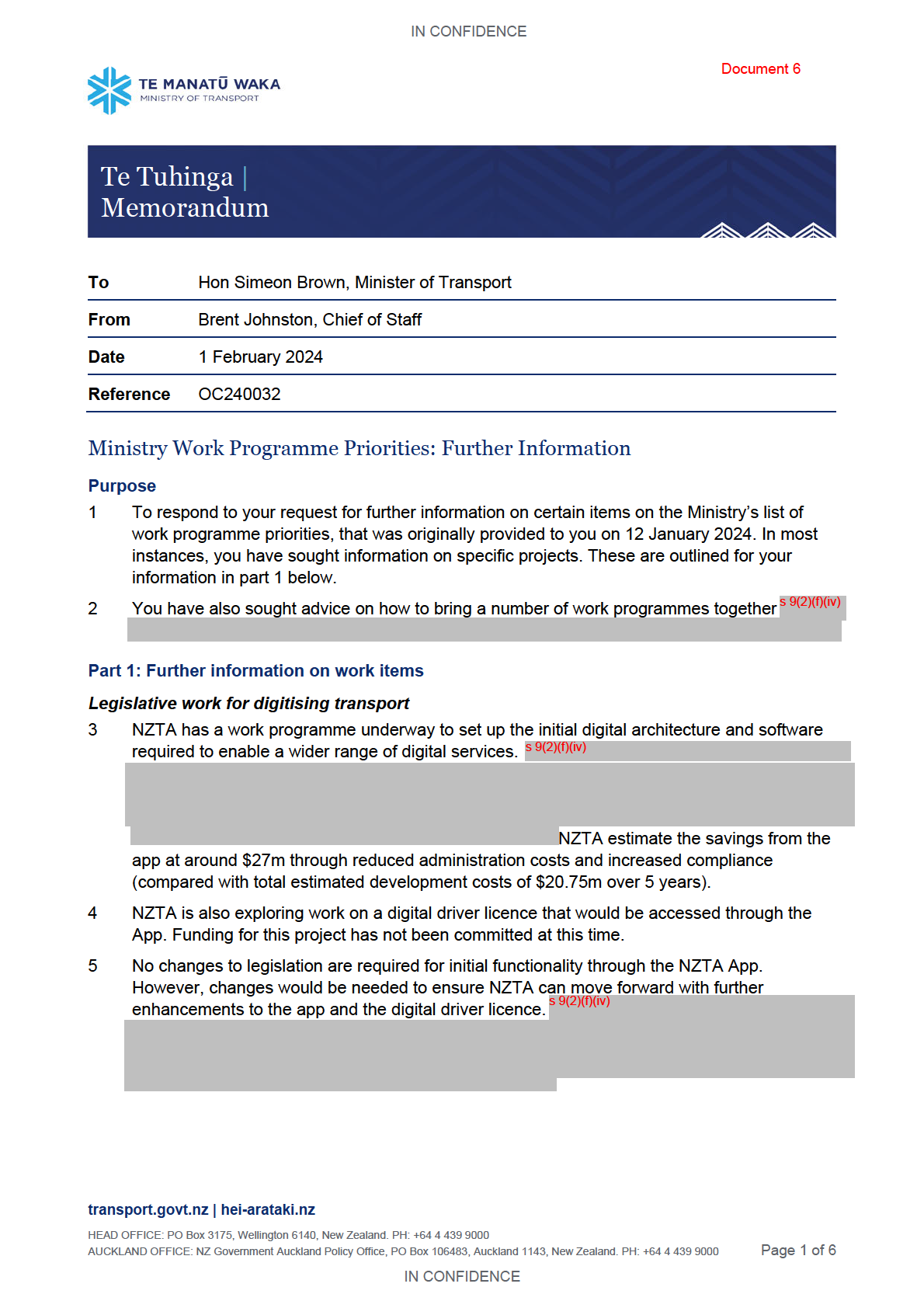
1982
THE
ACT
UNDER
INFORMATION
RELEASED
OFFICIAL
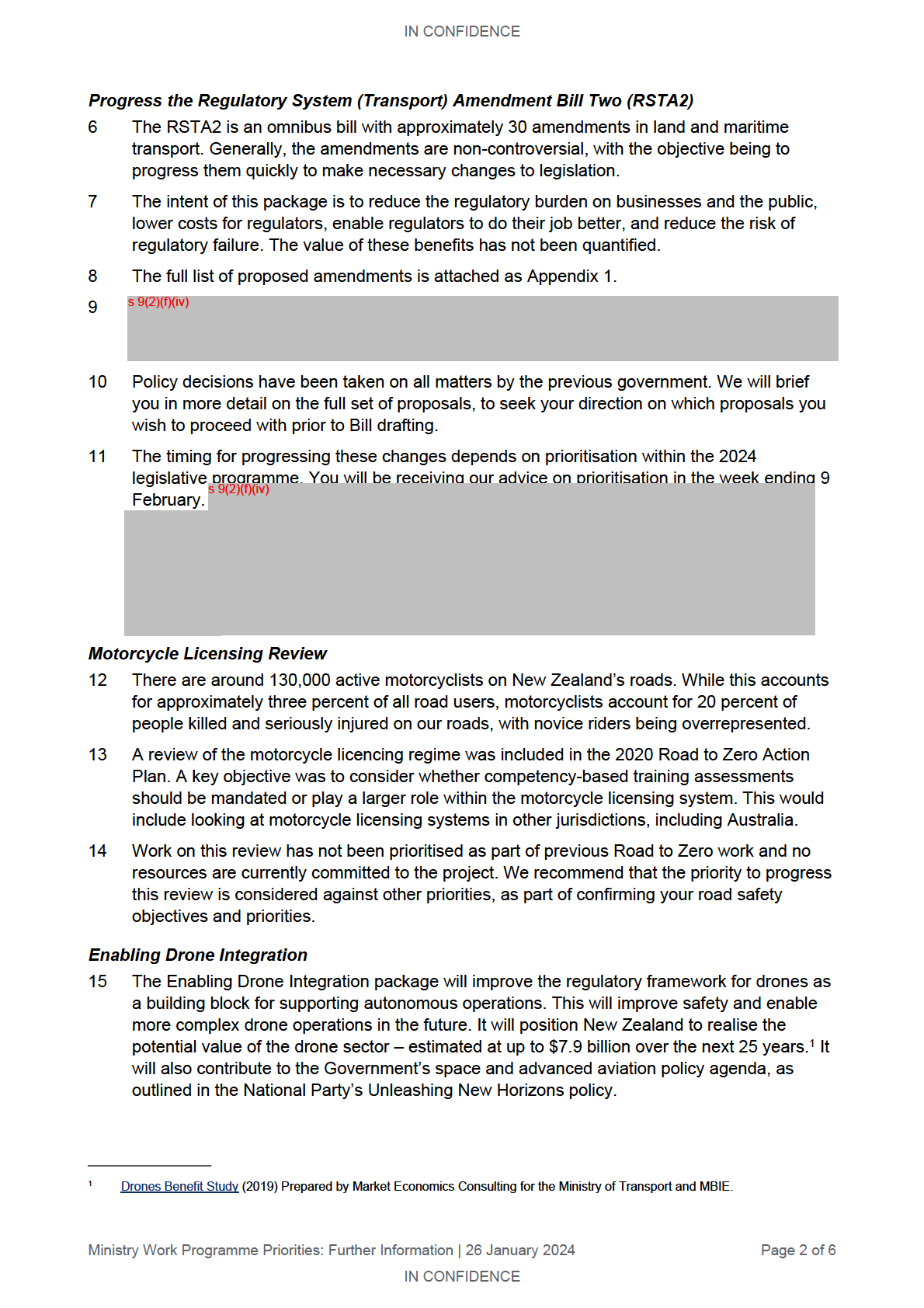
1982
THE
ACT
UNDER
INFORMATION
RELEASED
OFFICIAL
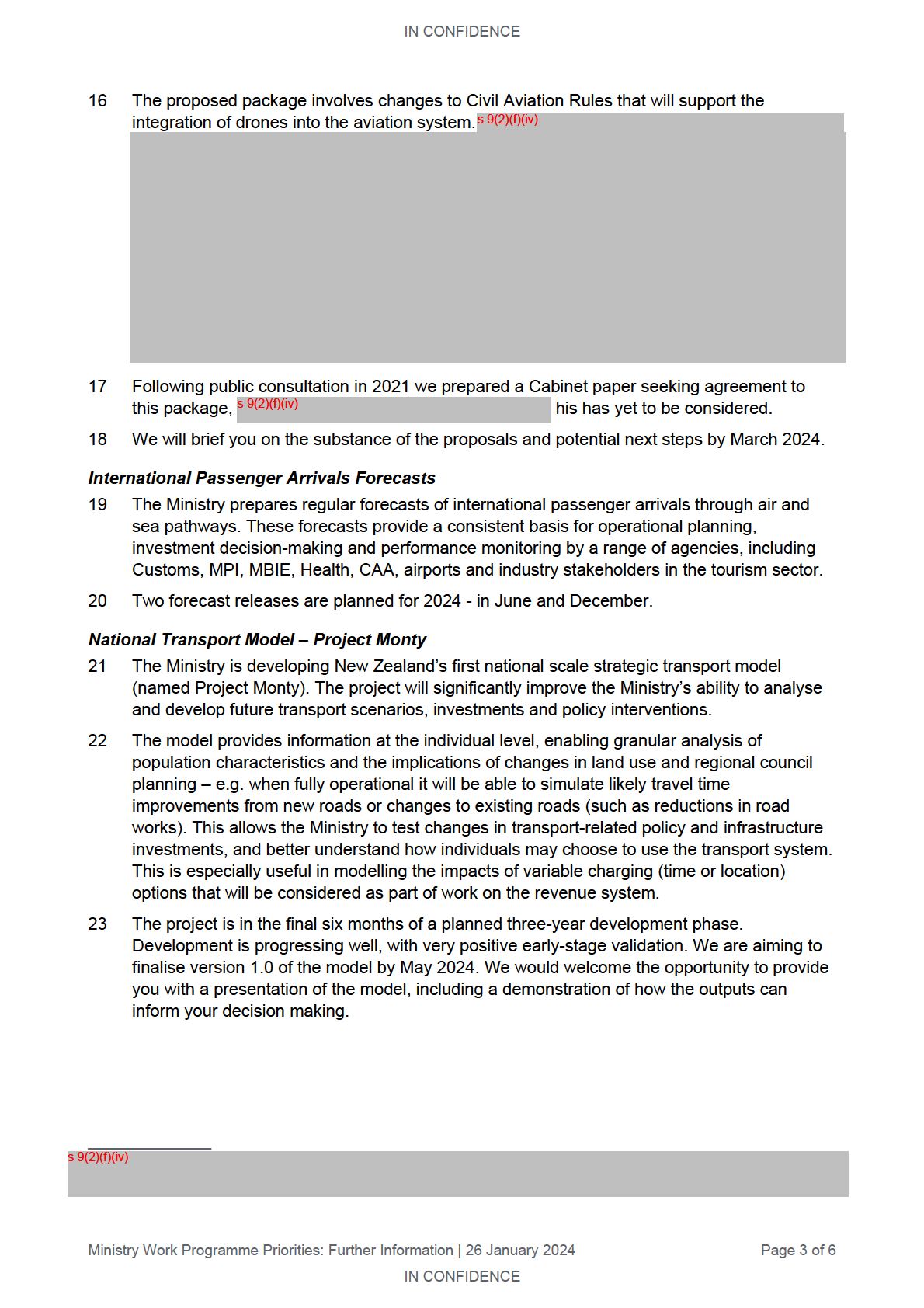
1982
THE
ACT
UNDER
INFORMATION
RELEASED
OFFICIAL
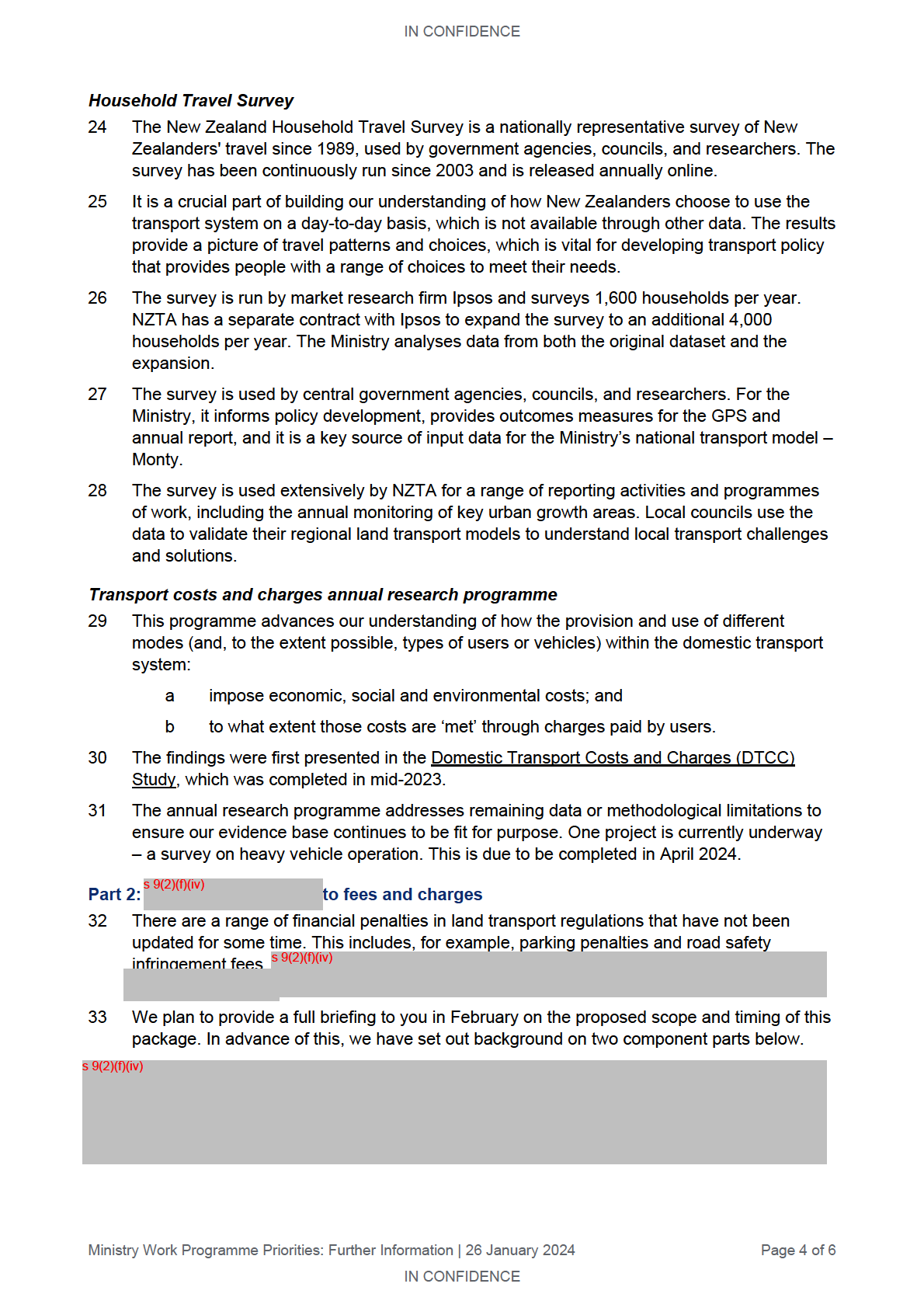
1982
THE
ACT
UNDER
INFORMATION
RELEASED
OFFICIAL

IN CONFIDENCE
s 9(2)(f)(iv)
37
The towage and storage sector are facing significant challenges. Police and local
government are dependent on commercial towage and storage operators to collect and store
vehicles. s 9(2)(f)(iv)
38
1982
THE
ACT
39
UNDER
40
INFORMATION
RELEASED
Brent Johnston
Tumuaki o ngā Kaimahi | Chief of Staff
Office of the Chief Executive
OFFICIAL
M: +64 22 066 4401
Ministry Work Programme Priorities: Further Information | 26 January 2024
Page 5 of 6
IN CONFIDENCE
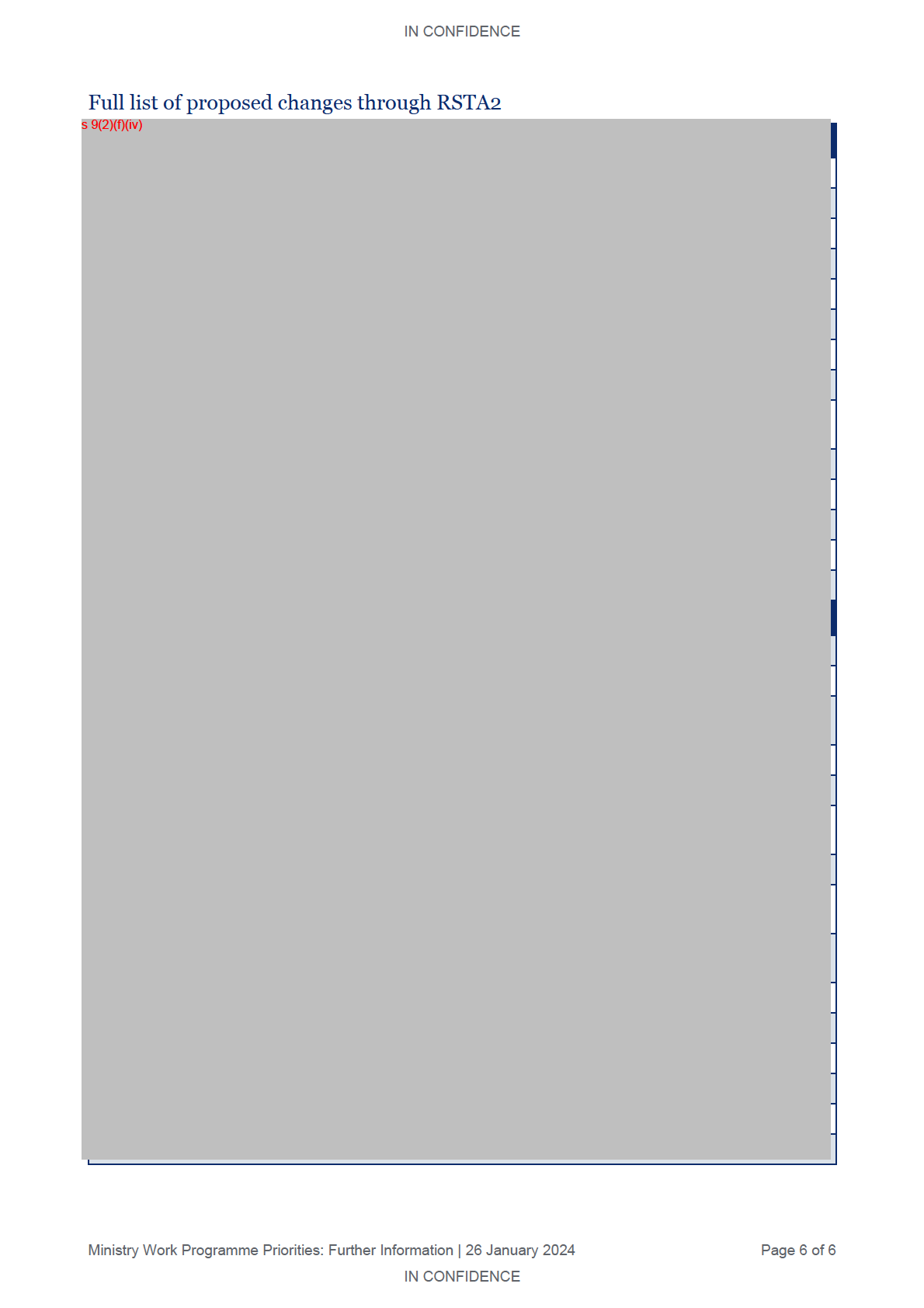
1982
THE
ACT
UNDER
INFORMATION
RELEASED
OFFICIAL
Document Outline





















